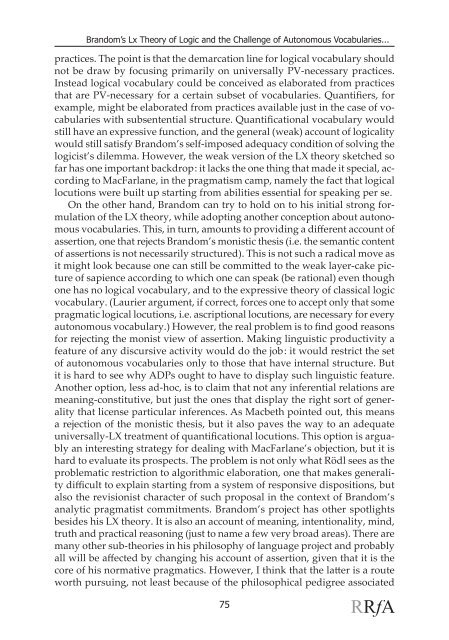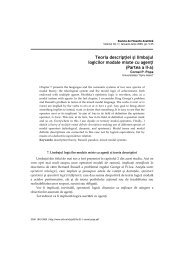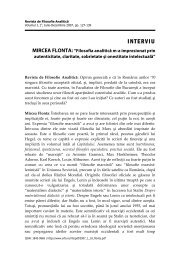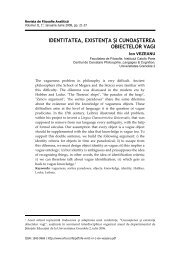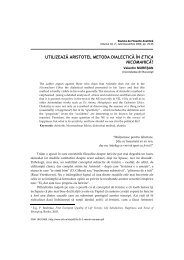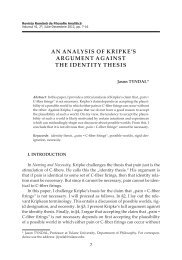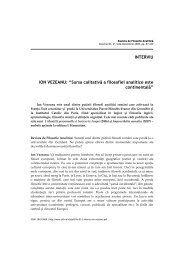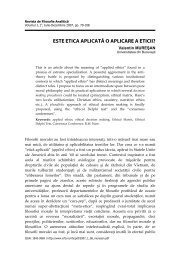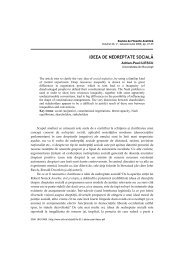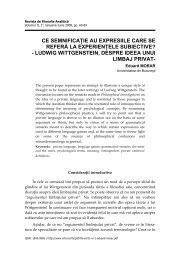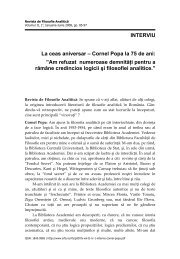brandom's lx theory of logic and the challenge of autonomous ...
brandom's lx theory of logic and the challenge of autonomous ...
brandom's lx theory of logic and the challenge of autonomous ...
You also want an ePaper? Increase the reach of your titles
YUMPU automatically turns print PDFs into web optimized ePapers that Google loves.
Br<strong>and</strong>om’s Lx Theory <strong>of</strong> Logic <strong>and</strong> <strong>the</strong> Challenge <strong>of</strong> Autonomous Vocabularies...<br />
practices. The point is that <strong>the</strong> demarcation line for <strong>logic</strong>al vocabulary should<br />
not be draw by focusing primarily on universally PV-necessary practices.<br />
Instead <strong>logic</strong>al vocabulary could be conceived as elaborated from practices<br />
that are PV-necessary for a certain subset <strong>of</strong> vocabularies. Quantifiers, for<br />
example, might be elaborated from practices available just in <strong>the</strong> case <strong>of</strong> vocabularies<br />
with subsentential structure. Quantificational vocabulary would<br />
still have an expressive function, <strong>and</strong> <strong>the</strong> general (weak) account <strong>of</strong> <strong>logic</strong>ality<br />
would still satisfy Br<strong>and</strong>om’s self-imposed adequacy condition <strong>of</strong> solving <strong>the</strong><br />
<strong>logic</strong>ist’s dilemma. However, <strong>the</strong> weak version <strong>of</strong> <strong>the</strong> LX <strong><strong>the</strong>ory</strong> sketched so<br />
far has one important backdrop : it lacks <strong>the</strong> one thing that made it special, according<br />
to MacFarlane, in <strong>the</strong> pragmatism camp, namely <strong>the</strong> fact that <strong>logic</strong>al<br />
locutions were built up starting from abilities essential for speaking per se.<br />
On <strong>the</strong> o<strong>the</strong>r h<strong>and</strong>, Br<strong>and</strong>om can try to hold on to his initial strong formulation<br />
<strong>of</strong> <strong>the</strong> LX <strong><strong>the</strong>ory</strong>, while adopting ano<strong>the</strong>r conception about <strong>autonomous</strong><br />
vocabularies. This, in turn, amounts to providing a different account <strong>of</strong><br />
assertion, one that rejects Br<strong>and</strong>om’s monistic <strong>the</strong>sis (i.e. <strong>the</strong> semantic content<br />
<strong>of</strong> assertions is not necessarily structured). This is not such a radical move as<br />
it might look because one can still be committed to <strong>the</strong> weak layer-cake picture<br />
<strong>of</strong> sapience according to which one can speak (be rational) even though<br />
one has no <strong>logic</strong>al vocabulary, <strong>and</strong> to <strong>the</strong> expressive <strong><strong>the</strong>ory</strong> <strong>of</strong> classical <strong>logic</strong><br />
vocabulary. (Laurier argument, if correct, forces one to accept only that some<br />
pragmatic <strong>logic</strong>al locutions, i.e. ascriptional locutions, are necessary for every<br />
<strong>autonomous</strong> vocabulary.) However, <strong>the</strong> real problem is to find good reasons<br />
for rejecting <strong>the</strong> monist view <strong>of</strong> assertion. Making linguistic productivity a<br />
feature <strong>of</strong> any discursive activity would do <strong>the</strong> job : it would restrict <strong>the</strong> set<br />
<strong>of</strong> <strong>autonomous</strong> vocabularies only to those that have internal structure. But<br />
it is hard to see why ADPs ought to have to display such linguistic feature.<br />
Ano<strong>the</strong>r option, less ad-hoc, is to claim that not any inferential relations are<br />
meaning-constitutive, but just <strong>the</strong> ones that display <strong>the</strong> right sort <strong>of</strong> generality<br />
that license particular inferences. As Macbeth pointed out, this means<br />
a rejection <strong>of</strong> <strong>the</strong> monistic <strong>the</strong>sis, but it also paves <strong>the</strong> way to an adequate<br />
universally-LX treatment <strong>of</strong> quantificational locutions. This option is arguably<br />
an interesting strategy for dealing with MacFarlane’s objection, but it is<br />
hard to evaluate its prospects. The problem is not only what Rödl sees as <strong>the</strong><br />
problematic restriction to algorithmic elaboration, one that makes generality<br />
difficult to explain starting from a system <strong>of</strong> responsive dispositions, but<br />
also <strong>the</strong> revisionist character <strong>of</strong> such proposal in <strong>the</strong> context <strong>of</strong> Br<strong>and</strong>om’s<br />
analytic pragmatist commitments. Br<strong>and</strong>om’s project has o<strong>the</strong>r spotlights<br />
besides his LX <strong><strong>the</strong>ory</strong>. It is also an account <strong>of</strong> meaning, intentionality, mind,<br />
truth <strong>and</strong> practical reasoning (just to name a few very broad areas). There are<br />
many o<strong>the</strong>r sub-<strong>the</strong>ories in his philosophy <strong>of</strong> language project <strong>and</strong> probably<br />
all will be affected by changing his account <strong>of</strong> assertion, given that it is <strong>the</strong><br />
core <strong>of</strong> his normative pragmatics. However, I think that <strong>the</strong> latter is a route<br />
worth pursuing, not least because <strong>of</strong> <strong>the</strong> philosophical pedigree associated<br />
75


